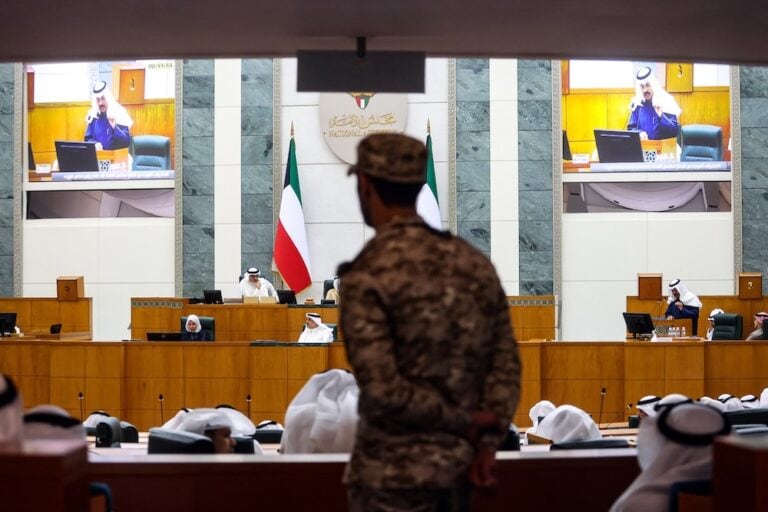The authorities should cease denying entry to visiting speakers solely on the basis of their opinions, says Human Rights Watch.
(Human Rights Watch/IFEX) – New York, February 18, 2010 – Kuwaiti authorities should cease denying entry to visiting speakers solely on the basis of their opinions, Human Rights Watch said today. The Interior Ministry has barred two prominent scholars – a Saudi cultural anthropologist and an Egyptian theologian – as well as a Saudi religious figure from entering the country in the past three months.
The government has given no official reason for refusing to let the three speakers enter the country. But in all three cases, the denials appear to be based on these individuals’ views on religion and politics, Human Rights Watch said.
“Kuwait is sending a message that political concerns trump the Kuwaiti public’s right to hear all sides of an issue,” said Joe Stork, deputy Middle East director at Human Rights Watch. “Kuwait should either demonstrate that it has a legitimate reason for barring persons from the country, or let them enter and speak freely.”
On February 11, 2010, Kuwaiti security officials canceled the visa of Madawi al-Rasheed, of Saudi origin and a professor of cultural anthropology at King’s College London, one week before she was scheduled to speak at a regional economic forum and lecture at the Women’s Institute of Development and Training.
In January, the government barred Muhammad al-‘Uraifi, a prominent Saudi cleric, from entering the country, despite frequent prior visits on which he publicly lectured and held sermons. In December, Interior Ministry officials turned away the Egyptian scholar, Nasr Hamid Abu Zayd, when he arrived at Kuwait International Airport, even though he held a valid visa. Abu Zayd, a scholar of the Quran who holds the Ibn Rushd Chair of Humanism and Islam at the Utrecht University for Humanistics in the Netherlands, had been invited to lecture on Islam and democracy by the Kuwaiti Women’s Cultural Society.
Islamist members of Kuwait’s parliament had publicly urged the interior minister, Sheikh Jaber Al-Khaled Al-Sabah, to deny Abu Zayd’s entry, during a time when al-Khaled needed parliamentary support to fight a motion that could remove him from office. Abu Zayd’s scholarly work on the Quran led to controversy in the mid-1990s after Egyptian Islamists succeeded in obtaining a court decision invalidating his marriage on the grounds that he was an “apostate.”
After Abu Zayd was turned away, minority Shia members of parliament called for the minister to bar al-‘Uraifi based on remarks he had allegedly made about a prominent Shia cleric in Iraq, Ali al-Sistani, which they found disparaging to Shia Muslims.
Al-Rasheed told Human Rights Watch that she believed the decision to cancel her visa stemmed from political pressure exerted by Saudi Arabia. Al-Rasheed’s academic work and frequent media contributions, often critical of the Saudi government, have raised the ire of Saudi officials. Jusoor Arabiya, a Kuwait-based leadership and consultancy group had invited al-Rasheed to speak on February 18 at its annual discussion forum on economic and political developments in the Middle East.
Al-Rasheed said she was aware of Abu Zayd and al-‘Uraifi’s cases, and that although Kuwait grants UK citizens like herself visit visas on arrival, she had obtained her Kuwaiti visa in advance, on January 26, to avoid a similar incident. The government had not contacted her directly nor issued any reason for cancelling her visa. A member of parliament, Aseel al-Awadhi, published a letter in the Kuwaiti online newspaper al-Aan, calling on the interior minister to make clear the reasons behind the decision.
“By denying these individuals entry, Kuwait only opens the door to further political interference in the right of Kuwaitis to freedom of information and the right of these visitors to freedom of expression,” Stork said. “Authorities should encourage civil society organizations in Kuwait to play an active role in regional debates instead of trying to silence them.”


